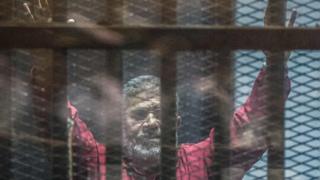Home » Middle East »
Mohammed Morsi’s trials and convictions
Egypt’s former President, Mohamed Morsi, has died while standing trial.
Morsi was overthrown by the military in July 2013 following mass protests, a year after he took office as the country’s first democratically elected leader.
A death sentence handed to the 67-year-old was quashed by an appeals court in 2016, but he remained in prison because of convictions on several charges. He was also facing retrials in two cases.
How did he end up in court?
Morsi was a leader of the now-banned Islamist movement, the Muslim Brotherhood. He was elected president a year after an uprising brought an end to Hosni Mubarak’s 30-year rule.
While in power, Morsi was seen by many Egyptians as preoccupied with establishing political control rather than tackling economic and social problems.
On the first anniversary of his taking office, opponents of Morsi organised demonstrations that saw millions take to the streets to demand his resignation. Three days later, then military chief – and now president – Abdul Fattah al-Sisi overthrew Morsi.
The authorities subsequently launched a crackdown on supporters of Morsi and the Muslim Brotherhood in which hundreds were killed and tens of thousands detained.
Morsi and his top advisers were held incommunicado by the military for several months before prosecutors began filing charges against them. He was first detained at a high-security prison near the Mediterranean city of Alexandria, and then moved to Tora prison outside Cairo.
What was Morsi convicted of?
DETENTION AND TORTURE OF PROTESTERS
Morsi was sentenced to 20 years of hard labour in April 2015 after being found guilty of ordering the unlawful detention and torture of opposition protesters during clashes with Muslim Brotherhood supporters outside the Ittihadiya presidential palace in Cairo in December 2012.
Morsi was, however, cleared of inciting Brotherhood supporters to murder two protesters and a journalist – a charge that could have carried the death penalty.
In October 2016, Egypt’s top appeals court, the Court of Cassation, confirmed Morsi’s conviction and the 20-year sentence.
LEADING AN ILLEGAL GROUP
In June 2015, Morsi was sentenced to 25 years in prison after being convicted of “leading a group established against the law” – the Brotherhood – and a further 15 years for “facilitating the leaking of classified documents to Qatar”.
Prosecutors alleged that Morsi’s aides had been paid $1m (£800,000) to leak documents to Qatari intelligence and the Qatar-owned Al Jazeera TV network that included details on the location of, and weapons held by, the Egyptian armed forces and on Egypt’s foreign and domestic policies.
In September 2017, the Court of Cassation acquitted Morsi of facilitating the leaking of classified documents, but upheld the conviction of leading an illegal group and the 25-year sentence.
INSULTING THE JUDICIARY
Morsi was accused of insulting the judiciary by naming a judge in a public speech and accusing him of overseeing fraud in previous elections
He was found guilty and sentenced to three years in prison in December 2017. He was also ordered to pay a $60,000 in compensation to the judge.
What about his other trials?
PRISON BREAKS
In May 2015, Morsi was sentenced to death after being convicted of colluding with foreign militants – from the Palestinian Islamist group Hamas and Lebanon’s Shia Islamist Hezbollah movement – to organise a mass prison break during the 2011 uprising.
He was found guilty of the murder and kidnapping of guards, damaging and setting fire to prison buildings, and looting the prison’s weapons depot.
In November 2016, the Court of Cassation overturned the conviction and ordered a retrial.
Last December, Morsi faced his predecessor Hosni Mubarak in court, as the latter testified during the retrial. No verdict had been reached before Morsi’s death.
CONSPIRING WITH FOREIGN ARMED GROUPS
Morsi was also given a life sentence – equivalent to 25 years – in May 2015 after being convicted of conspiring to commit terrorist acts with foreign organisations to undermine national security.
Prosecutors alleged that the Brotherhood had hatched a plan in 2005 to send “elements” to military camps run by Hamas in the Gaza Strip, Hezbollah in Lebanon, and the Revolutionary Guards force in Iran.
In November 2016, the Court of Cassation overturned the conviction and ordered a retrial.
Morsi was attending a session of this retrial when he died. The public prosecutor said he had collapsed in the defendants’ cage shortly after addressing the court.
What did Morsi say about the trials?
Morsi rejected the authority of the courts.
At the start of his first trial in November 2013, he shouted from the dock that he was the victim of a “military coup”.
“I am Egypt’s legitimate president. You have no right to conduct a trial into presidential matters,” he asserted.
After that, Morsi was forced to sit in soundproof glass cages in courtrooms, which officials said were designed to prevent him disrupting proceedings.
Morsi’s supporters said the trials were politically motivated and attempts to give legal cover to a coup.
Human rights activists have said the trials were compromised by due process violations, the appearance of bias, and an absence of conclusive evidence.
Source: Read Full Article



